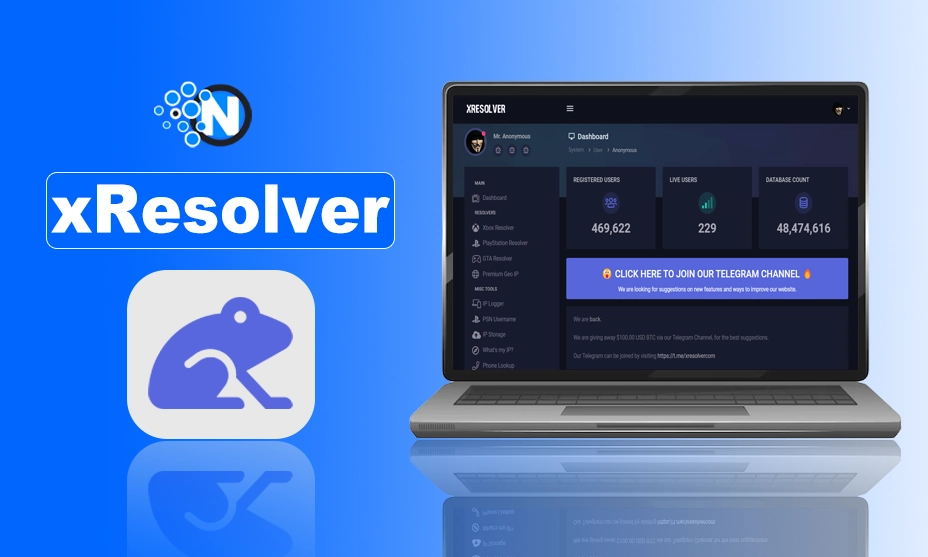The internet has revolutionized how we connect, play, and interact. For gamers, online connectivity has transformed the industry into a global community. However, as gaming technology advances, so do potential risks and controversies. One term you might come across in online gaming communities is xResolver. This guide dives deep into what xResolver is, how it works, its potential risks, and how to protect yourself.
What is xResolver?
xResolver is a database-driven service designed to log and store publicly available information about gaming devices, specifically IP addresses linked to Gamertags or usernames. Primarily associated with platforms like Xbox and PlayStation, xResolver has become notorious for being used in malicious activities, such as DDoS (Distributed Denial-of-Service) attacks, swatting, and online harassment.
At its core, xResolver collects information through a process called IP scraping. When a gamer is in an online session, their public IP address can be exposed. Tools known as IP sniffers or booters collect these addresses and link them to specific Gamertags or usernames, feeding this information into a database like xResolver.
How Does xResolver Work?
xResolver operates by leveraging information that is technically public. Here’s a breakdown of its operation:
- IP Address Collection:
- Players’ IP addresses can be revealed during online gaming sessions. Tools like Wireshark or specific game modding software extract this data.
- The IP address is then linked to a Gamertag or username based on server data or other identifiers.
- Database Entry:
- Once collected, the information is added to the xResolver database. This database is searchable, allowing users to find the IP address associated with a specific username or Gamertag.
- User Access:
- While xResolver claims to operate within the boundaries of legality (since IP addresses are public), many argue that its purpose is unethical.
- Some people use xResolver to engage in disruptive activities, like flooding a player’s network with data (DDoS attacks), leading to a disrupted or slow internet connection.
Why is xResolver Controversial?
xResolver exists in a gray area of legality. While collecting and displaying public IP addresses isn’t inherently illegal, the platform’s potential misuse raises ethical concerns.
- Privacy Invasion:
- Even though IP addresses are public information, most users don’t expect their data to be easily accessible or linked to their gaming identity.
- Facilitating Malicious Activities:
- Tools like xResolver can be used to launch cyberattacks. For instance, a disgruntled player might use xResolver to retrieve your IP address and launch a DDoS attack, effectively taking you offline.
- Monetization of Privacy:
- Some IP scraping tools, including xResolver, offer premium services to remove your IP address from their database. This “pay-to-remove” model can feel exploitative and akin to extortion.
Risks Associated with xResolver
If you’re a gamer, xResolver poses several risks, including:
- DDoS Attacks:
- The most common risk is a DDoS attack, where your network is bombarded with excessive traffic, causing connectivity issues or complete disconnection.
- Swatting:
- In extreme cases, users may combine xResolver data with other information to engage in swatting—a dangerous and illegal practice of reporting false emergencies to send law enforcement to a victim’s location.
- Identity Theft:
- While IP addresses alone don’t reveal much personal information, combining them with other details (social engineering) can lead to identity theft.
- Targeted Harassment:
- Gaming communities can sometimes be toxic. Having your IP address linked to your gaming identity may make you a target for harassment or trolling.
How to Protect Yourself from xResolver
Protecting yourself against xResolver and similar platforms involves a mix of technical solutions and common-sense practices. Here are key steps:
1. Use a VPN
A Virtual Private Network (VPN) is one of the best ways to hide your IP address. By routing your internet traffic through a secure server, VPNs mask your actual IP address, making it nearly impossible for others to track or log it.
2. Avoid Public Networks
Public Wi-Fi networks are highly vulnerable to IP sniffing. Avoid gaming on public networks or ensure you’re connected to a VPN if you must use them.
3. Update Privacy Settings
Both Xbox and PlayStation have privacy settings that allow you to control who can join your sessions, message you, or view your online status. Tightening these settings can reduce the likelihood of exposure.
4. Use Firewalls and Security Tools
Ensure your home network is secured with a firewall and keep your gaming devices updated with the latest software patches to mitigate vulnerabilities.
5. Avoid Sharing Personal Information
Refrain from sharing personal details, even casually, in online gaming environments. This includes usernames that might be tied to your real-life identity.
6. Monitor Your Network
Network monitoring tools can help detect unusual activity, such as a potential DDoS attack. Early detection allows you to take action quickly.
7. Request IP Removal
If your IP address has been logged on xResolver, you can attempt to request its removal. While some services charge a fee, others might offer free removal.
Legal Implications of xResolver
While xResolver operates within the letter of the law by claiming to share publicly available information, its potential misuse could lead to legal consequences for individuals engaging in malicious activities. In many countries:
- DDoS attacks are illegal and can result in severe penalties, including fines and imprisonment.
- Swatting is a criminal offense with serious consequences.
If you’re a victim of such attacks, reporting the incident to local law enforcement and your internet service provider (ISP) is crucial.
Alternatives to xResolver
Several platforms offer similar services to xResolver. Understanding them can help you avoid potential threats:
- OctoSniff:
- A tool designed to extract IP addresses from gaming sessions. While marketed as an “analyzer,” its misuse mirrors that of xResolver.
- Lanc Remastered:
- Another IP sniffing tool popular in gaming circles. Often used to pull IP addresses during live sessions.
- Booter Services:
- These platforms claim to offer DDoS attacks as a service, often targeting gamers for a fee.
While these alternatives may be presented as benign tools, their potential for misuse remains significant.
Final Thoughts
xResolver highlights the darker side of online gaming, where privacy can be compromised, and malicious activities can thrive. However, by understanding how xResolver works and taking proactive measures, gamers can significantly reduce the risks associated with platforms like this.
The key to a safer online gaming experience lies in vigilance. Whether it’s using tools like VPNs, updating privacy settings, or educating yourself about potential threats, staying informed is your best defense.
If you’re a victim of xResolver or similar platforms, remember: you’re not powerless. From legal recourse to technical solutions, there are ways to protect your online identity and enjoy a safe gaming experience.





